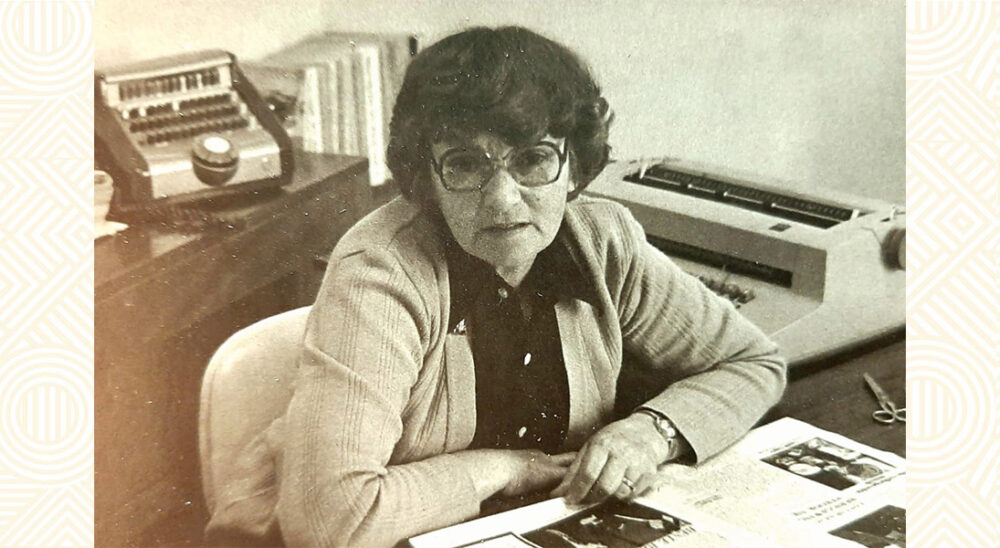
[Article by Irabe]
Winie Rousseau, born Winifred Louise Schumann, was the first secretary of the Department of Journalism from its inception in 1978 until her retirement in 1994. She had ink in her veins, was herself a journalist, and the position in 1978’s Crozier Street was custom-made for her after her divorce the previous year from publisher Leon Rousseau, one of the co-founders of Human & Rousseau.
“Mrs Rousseau”, as she has always been referred to with awe, was much more than a secretary to founding Professor Piet Cillié and everyone who crossed the threshold of 26 Crozier Street. She was Crozier Street’s very first Mother Superior, and guarded sternly, but with compassion, the Crozier roost to keep the sometimes boisterous youngsters on the straight and narrow.
Opportunists soon learned she can see right through pathetic excuses. When certain members of that first class of 1978 decided that Gordon’s Bay’s Bikini Beach was far more informative than Crozier Street’s lecture hall – those with tender skins still radiated with sunburn days later – she lined them up in front of her: “SHAME on you! Prof Cillié puts SO MUCH effort into your course, and THAT’s how you thank him?!” Actually, every word was in capital letters.
The sad group went to comfort each other with a cup of Ricoffy on the back porch – that mixture of a bit of coffee and lots of chicory for which we had to pay our R5 punctually every month to Mrs Rousseau to have the luxury of a bad cup coffee with a clear conscience.
But she kept us on that straight and narrow. “Mother hen” is one of the words with which a member of the Class of ’78 describes her. Another: “Winie Rousseau was one of a few real mother figures in my life at a very vulnerable time.” But she was also the one who made sure that no one took a chance. As Bun Booyens recalls from his year in 1986: Their routine “revolved around Fridays, when each had to submit his weekly quota of three stories” to Mrs Rousseau. Also: “She kept record of how many stories you owed, and monitored class attendance equally closely. To the dismay of some, it also turned out that she did not hesitate to call absentees at home, and, above all, how she was able to make a surprisingly accurate medical diagnosis over the phone: ‘No, you do not sound ill at all,’ she once told me. ‘Come to class.’”
When she retired in 1994 at 65 – it was also the year in which Professor Johannes Grosskopf handed the baton to Professor George Claassen – she wrote in a letter the day after her farewell party to Prof Claassen: “I think the Department thrives because the right person arrived every time at the right time, and because everyone has the ‘common weal’ at heart, not only for each other, and for the students, but also for journalism’s core mission.”
Winie Rousseau was part of Stellenbosch nobility; her father was the economics professor after whom the CGW Schumann building is named. But even though she personified “Stellenbossiana”, she always made you feel that you belonged. As a member of the Class of ’78, having just arrived from Natal, then still the Last Outpost of the British Empire, remembers: “Mrs Rousseau was so much part of the positive energy that made the department so successful that year. I remember I went to Stellenbosch a few days before so that I could organise my accommodation for the year, and as I walked into her office, she looked at me and said: ‘You must be Mr Hopwood.’ I felt so welcomed by her warmth and generosity. I am sure we all felt that and we owe her our gratitude.”
Mrs Rousseau, there was only one like you. Thank you for the special foundation that 26 Crozier Street was built on, thanks to you.
Main Image: The one and only “Mrs. Rousseau”. (Photo: Bruce Hopwood)
 The class of 1978; Mrs Rousseau in the middle
The class of 1978; Mrs Rousseau in the middle
(in front of the open door).
 The class of 1994, Mrs Rousseau’s last year,
The class of 1994, Mrs Rousseau’s last year,
second from right; it was also the transition
year between Profs Claassen and Grosskopf.

